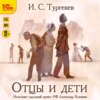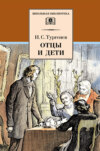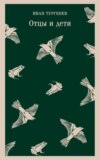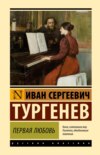Читать книгу: «The Diary of a Superfluous Man, and Other Stories»
PREFACE
"In 'The Diary of a Superfluous Man,'" says one well-known Russian critic, "we have to deal with the end of the pathological process upon the body of Russian society. In Turgénieff's productions which followed it we have to deal with a crisis in Russian life, with the growth of a new order of things. Apart from the fundamental profundity of its tendency, the 'Diary' is extremely noteworthy for its artistic workmanship. In spite of a certain monotony of tone in its exposition, it produces a very strong impression by its abundance of poetical beauties, which are perfectly suited to the melancholy mood of the whole story… In creating his 'Superfluous Man' the author, evidently, aimed at making as powerful an impression as possible, and therefore employed the most brilliant pigments in depicting Tchulkatúrin. He attained his object. Russian society started back in horror at this portrait of itself, which was somewhat distorted yet a good likeness, and in its strong excitement vigorously repelled all community with the sickly figure of Tchulkatúrin. This horror showed that the time was ripe in Russian society for a different order of things, that it was tired of inertness and was seeking a wider field of activity in which it might freely develop its real forces."
Another critic, comparing the "Diary" with "Hamlet of Shshtchígry County," says that what the latter expressed with a convulsive laugh Tchulkatúrin gave vent to in sickly, complaining shrieks, both productions being a bitter confession of moral impotence, of mental insolvency. "There is one passage in the 'Diary,'" he says, "which – especially if one comes upon it after perusing all that precedes it – it is impossible to read without a strong nervous shock, if not without tears – a passage which always has the same identical effect; and it contains the key to the comprehension of Turgénieff's relations toward Nature. It is the end of the 'Diary.' This passage is noteworthy. The predominant characteristic of Turgénieff's talent is here revealed in a particularly brilliant manner: a profound impregnation with Nature, – an impregnation which reached the point almost of fusion with it. The breath of spring blows upon the reader, there is a scent of the upturned soil, – and nowhere else, possibly save in that chapter of Tolstóy's 'Youth,' which describes the removal of the double windows, and the reader is suddenly enveloped in the keen, fresh air of spring, is there anything which can be compared with this passage."
Still another critic says: "The ironical analysis of the moral feebleness of the Russian intellectual class, which constitutes the ruling motive of 'Hamlet of Shshtchígry County,' is converted into sickly complaint in 'The Diary of a Superfluous Man,' one of the most original and best-sustained of Turgénieff's stories, and one which is most profoundly imbued with feeling.
"Turgénieff's story 'Three Portraits,'" said the most famous of Russian critics, Byelínsky, "possesses, in addition to the cleverness and vividness of its presentation, all the fascination, not of a novel, but rather of a reminiscence of the good old times. A fitting motto for it would be: 'Deeds of days gone by.'"
All the critics admit that the type of Vasíly Lutchínoff had existed, and one says: "I attribute special importance to Turgénieff's Vasíly Lutchínoff because, in this character, the old type of Don Juan, of Lovelace, and so forth, assumed our own Russian, original form for the first time." This type (equally rapacious with that presented by the hero of "The Bully," which was written about the same time) is supposed to have prevailed in the eighteenth century, especially in the epoch of Katherine II. Although Turgénieff never wrote historical novels, this story, in company with passages from others of his works, is regarded as coming, practically, under the head of historical records faithful to the epochs dealt with by the author.
"The story 'Three Meetings,'" says one critic, "belongs entirely in the category of 'art for art's sake.' There can be no question here of any guiding idea. To speak figuratively, it is a fragrant flower, whose perfume one inhales with delight, but which presents no other essential qualities. Its whole point lies in its workmanship, and in paraphrase it loses its entire charm."
"This story," writes another critic, "may serve, in our opinion, as a curious monument of the ineptness of narrations in the first person. Turgénieff, who is such a complete master of the form of personal narration, was bound to exhibit also the weak side of it in its entirety. This has strutted forth in his 'Three Meetings' with such pride, independence, and, in a measure, with so much coquetry, that it has swallowed up its subject-matter. There are several brilliant pages in the story, but its fantastic, showy matter seems to be directed solely to the end of illuminating the person of the narrator in the most advantageous manner."
In discussing "The Memoirs of a Sportsman," a leading critic of the present day says:… "Another peculiarity which immediately won for him [Turgénieff] fame and sympathy among the public, is his entirely new manner of depicting figures from peasant life. Before the advent of Turgénieff the populace, even in the hands of Púshkin, even in those of Gógol, appeared either in the capacity of an operatic chorus, or in the quality of peasants of the ballet, or as an accessory, comic figure. Turgénieff was the first to look into the soul of the common people and demonstrate that that soul was exactly like the soul of the cultivated man, only with its own peculiar turn to conceptions and feelings. By thus bringing the peasant close to us, by exhibiting him in this form, as a being one with us in blood, with whom, therefore, one can sympathise instead of regarding him merely as a rare spectacle, Turgénieff deservedly earned the reputation of a champion of emancipation… Two other tales are closely allied to 'The Memoirs of a Sportsman,' although they do not form a part of that collection: 'Mumú' and 'The Inn.'… One of them, 'Mumú,' is, perhaps, the most eloquent denunciation of serfdom which ever proceeded from Turgénieff's pen. It is the only one of his productions in which the central figure of the pig-headed1 landed-proprietress is delineated with vivid and unconcealed hatred. But in this case also, the chief merit of the story does not lie in this arraignment, – in which are probably reflected the author's childish reminiscences,2 – but in its warm, compassionate sympathy for the lot of the poor dumb man, whose whole life was concentrated in love for a creature equally ill-treated by Fate – for the little dog he had reared. In 'The Inn,' also, serfdom is set forth in an extreme and hateful light. But here again the chief gist of the author's idea does not lie in that direction… It is evident that here Turgénieff has touched on the theme to which Dostoiévsky was so fond of reverting. That theme is – the accidental sin of a good and honest man, the crime of a pure mind atoned for by voluntary renunciation, and the reconciling power of repentance, humility and prayer. Evil remains unpunished in Turgénieff's story… And yet the story produces a shattering moral effect, thanks to the humble grandeur of Akím's figure, and its combination of meekness and criminality. Mean as Naúm is in his triumph, repulsive as is landed-proprietress Elizavéta Prókhorovna with her cowardly and hypocritical greed, the story leaves on the reader a soothing impression."
I. F. H.
THE DIARY OF A SUPERFLUOUS MAN
(1850)
[Pg 2]
[Pg 3]
Hamlet of Ovétchi-Vódy,3March 20, 18 .
The doctor has just left me. At last I have obtained a categorical answer! Dodge as he might, he could not help saying what he thought, at last. Yes, I shall die soon, very soon. The streams are opening, and I shall float away, probably with the last snows … whither? God knows! To the sea also. Well, all right! If I must die, then 't is better to die in the spring. But is it not ridiculous to begin one's diary perhaps a fortnight before one's death? Where 's the harm? And in what way are fourteen days less than fourteen years, fourteen centuries? In the presence of eternity, they say, everything is of no account – yes; but, in that case, eternity also is of no account. I am falling into speculation, I think: that is a bad sign – am not I beginning to turn coward? – It will be better if I narrate something. It is raw and windy out of doors, – I am forbidden to go out. But what shall I narrate? A well-bred man does not talk about his maladies; composing a novel, or something of that sort, is not in my line; reflections about exalted themes are beyond my powers; descriptions of life round about me do not even interest me; and to do nothing is tiresome; to read – is idleness. Eh! I will narrate to myself the story of my own life. A capital idea! When death is approaching it is proper, and can offend no one. I begin.
I was born thirty years ago, the son of a fairly wealthy landed proprietor. My father was a passionate gambler; my mother was a lady with character … a very virtuous lady. Only, I have never known a woman whose virtue afforded less satisfaction. She succumbed under the burden of her merits, and tortured everybody, beginning with herself. During the whole fifty years of her life, she never once rested, never folded her hands; she was eternally bustling and fussing about, like an ant – and without any result whatever, which cannot be said of the ant. An implacable worm gnawed her day and night. Only once did I behold her perfectly quiet, – namely, on the first day after her death, in her coffin. As I gazed at her, it really seemed to me that her face expressed mild surprise; the half-open lips, the sunken cheeks, and the gently-motionless eyes seemed to breathe forth the words: "How good it is not to stir!" Yes, 't is good, 't is good to part at last from the fatiguing consciousness of life, from the importunate and uneasy sense of existence! But that is not the point.
I grew up badly, and not cheerfully. Both my father and my mother loved me; but that did not make things any the easier for me. My father had no power whatever in his own house, and no importance, in his quality of a man given over to a shameful and ruinous vice. He admitted his fall, and, without having the strength to renounce his favourite passion, he endeavoured, at least, by his constantly affectionate and discreet mien, by his submissive humility, to win the indulgence of his exemplary wife. My mamma, in fact, bore her misfortune with that magnificent and ostentatious long-suffering of virtue which contains so much of self-satisfied pride. She never reproached my father for anything, she silently surrendered to him her last penny, and paid his debts; he lauded her to her face and behind her back, but was not fond of staying at home, and petted me on the sly, as though he were himself afraid of contaminating me by his presence. But his ruffled features exhaled such kindness at those times, the feverish smirk on his lips was replaced by such a touching smile, his brown eyes, surrounded by fine wrinkles, beamed with so much love, that I involuntarily pressed my cheek to his cheek, moist and warm with tears. I wiped away those tears with my handkerchief, and they flowed again, without effort, like the water in an overfilled glass. I set to crying myself, and he soothed me, patted my back with his hand, kissed me all over my face with his quivering lips. Even now, more than twenty years after his death, when I recall my poor father, dumb sobs rise in my throat, and my heart beats – beats as hotly and bitterly, it languishes with as much sorrowful compassion, as though it still had a long time to beat and as though there were anything to feel compassion about!
My mother, on the contrary, always treated me in one way, affectionately, but coldly. Such mothers, moral and just, are frequently to be met with in children's books. She loved me, but I did not love her. Yes! I shunned my virtuous mother, and passionately loved my vicious father.
But enough for to-day. I have made a beginning, and there is no cause for me to feel anxious about the end, whatever it may be. My malady will attend to that.
March 21.
The weather is wonderful to-day. It is warm and bright; the sun is playing gaily on the slushy snow; everything is glittering, smoking, dripping; the sparrows are screaming like mad creatures around the dark, sweating hedges; the damp air irritates my chest sweetly but frightfully. The spring, the spring is coming! I am sitting by the window, and looking out across the little river to the fields. O Nature! Nature! I love thee so, but I came forth from thy womb unfitted even for life. Yonder is a male sparrow hopping about with outspread wings; he is screaming – and every sound of his voice, every ruffled feather on his tiny body breathes forth health and strength.
What is to be concluded from that? Nothing. He is healthy and has a right to scream and ruffle up his feathers; but I am ill and must die – that is all. It is not worth while to say any more about that. And tearful appeals to nature are comically absurd. Let us return to my story.
I grew up, as I have already said, badly and not cheerfully. I had no brothers or sisters. I was educated at home. And, indeed, what would my mother have had to occupy her if I had been sent off to boarding-school or to a government institute? That 's what children are for – to keep their parents from being bored. We lived chiefly in the country, and sometimes went to Moscow. I had governors and teachers, as is the custom. A cadaverous and tearful German, Riechmann, has remained particularly memorable to me, – a remarkably melancholy being, crippled by fate, who was fruitlessly consumed by an anguished longing for his native land. My man-nurse, Vasíly, nicknamed "The Goose," would sit, unshaved, in his everlasting old coat of blue frieze, beside the stove in the frightfully stifling atmosphere of the close anteroom, impregnated through and through with the sour odour of old kvas, – would sit and play cards with the coachman, Potáp, who had just got a new sheepskin coat, white as snow, and invincible tarred boots, – while Riechmann would be singing on the other side of the partition:
"Herz, mein Herz, warum so traurig?
Was bekümmert dich so sehr?
'S ist ja schön im fremden Lande —
Herz, mein Herz, was willst du mehr?"
After my father's death, we definitively removed to Moscow. I was then twelve years of age. My father died during the night of a stroke of apoplexy. I shall never forget that night. I was sleeping soundly, as all children are in the habit of sleeping; but I remember, that even athwart my slumber I thought I heard a heavy, laboured breathing. Suddenly I felt some one seize me by the shoulder and shake me. I open my eyes: in front of me stands my man-nurse. – "What 's the matter?" – "Come along, come along, Alexyéi Mikhaílitch is dying…" I fly out of the bed like a mad creature, and into the bedroom. I look: my father is lying with his head thrown back, all red in the face, and rattling in his throat most painfully. The servants, with frightened faces, throng the doors; in the anteroom some one inquires in a hoarse voice: "Has the doctor been sent for?" In the courtyard, a horse is being led out of the stable, the gate is creaking, a tallow candle is burning in the room on the floor; mamma is there also, overwhelmed, but without losing either her decorum or the consciousness of her own dignity. I flung myself on my father's breast, embraced him, and stammered out: "Papa, papa!"… He lay motionless and puckered up his eyes in a strange sort of way. I looked him in the face – unbearable horror stopped my breath; I squeaked with terror, like a roughly-grasped bird. They dragged me from him and carried me away. Only the night before, as though with a foreboding of his approaching death, he had caressed me so fervently and so sadly.
They brought a dishevelled and sleepy doctor, with a strong smell of lovage vodka. My father died under his lancet, and on the following day, thoroughly stupefied with grief, I stood with a candle in my hand in front of the table on which lay the corpse, and listened unheeding to the thick-voiced intoning of the chanter, occasionally broken by the feeble voice of the priest; tears kept streaming down my cheeks, over my lips, and my collar and my cuffs; I was consumed with tears, I stared fixedly at the motionless face of my father, as though I were expecting him to do something; and my mother, meanwhile, slowly made reverences to the floor, slowly raised herself and, as she crossed herself, pressed her fingers strongly to her brow, her shoulders, and her body. There was not a single thought in my head; I had grown heavy all over, but I felt that something dreadful was taking place with me… It was then that Death looked into my face, and made a note of me.
We removed our residence to Moscow, after the death of my father, for a very simple reason: all our estate was sold under the hammer for debt, – positively everything, with the exception of one wretched little hamlet, the very one in which I am now finishing my magnificent existence. I confess that, in spite of the fact that I was young at the time, I grieved over the sale of our nest; that is to say, in reality, I grieved over our park only. With that park are bound up my sole bright memories. There, on one tranquil spring evening, I buried my best friend, an old dog with a bob tail and crooked paws – Trixie; there, hiding myself in the tall grass, I used to eat stolen apples, red, sweet Nóvgorod apples; there, in conclusion, I for the first time beheld through the bushes of ripe raspberries, Klaudia the maid, who, despite her snub nose, and her habit of laughing in her kerchief, aroused in me such a tender passion that in her presence I hardly breathed, felt like swooning, and was stricken dumb. But one day, on the Bright Sunday,4 when her turn came to kiss my lordly hand, I all but flung myself down and kissed her patched goatskin shoes. Great heavens! Can it be twenty years since all that happened? It does not seem so very long since I used to ride my shaggy, chestnut horse along the old wattled hedge of our park, and, rising in my stirrups, pluck the double-faced leaves of the poplars. While a man is living he is not conscious of his own life; like a sound, it becomes intelligible to him a little while afterward.
Oh, my park! Oh, my overgrown paths along the little pond! Oh, unhappy little spot beneath the decrepit dam, where I used to catch minnows and gudgeons! And you, ye lofty birch-trees, with long, pendulous branches, from behind which, from the country road, the melancholy song of the peasant used to be wafted, unevenly broken by the jolts of the rough cart – I send you my last farewells!.. As I part with life I stretch out my hands to you alone. I should like once more to inhale the bitter freshness of the wormwood, the sweet scent of the reaped buckwheat in the fields of my natal spot; I should like once more to hear from afar the modest jangling of the cracked bell on our parish church; once more to lie in the cool shadow beneath the oak-bush on the slope of the familiar ravine; once more to follow with my eyes the moving trace of the wind, as it flew like a dark streak over the golden grass of our meadow…
Ekh, to what end is all this? But I cannot go on to-day. Until to-morrow.
March 22.
To-day it is cold and overcast again. Such weather is far more suitable. It is in accord with my work. Yesterday quite unseasonably evoked in me a multitude of unnecessary feelings and memories. That will not be repeated. Emotional effusions are like liquorice-root: when you take your first suck at it, it does n't seem bad, but it leaves a very bad taste in your mouth afterward. I will simply and quietly narrate the story of my life.
So then, we went to live in Moscow…
But it just occurs to me: is it really worth while to tell the story of my life?
No, decidedly it is not worth while… My life is in no way different from the lives of a mass of other people. The parental home, the university, service in inferior positions, retirement, a small circle of acquaintances, downright poverty, modest pleasures, humble occupations, moderate desires – tell me, for mercy's sake, who does not know all that? And I, in particular, shall not tell the story of my life, because I am writing for my own pleasure; and if my past presents even to me nothing very cheerful, nor even very sorrowful, that means that there really can be nothing in it worthy of attention. I had better try to analyse my own character to myself.
What sort of a man am I?.. Some one may remark to me that no one asks about that. – Agreed. But, you see, I am dying, – God is my witness, I am dying, – and really before death the desire to know what sort of a fellow I have been is pardonable, I think.
After having thoroughly pondered this important question, and having, moreover, no need to express myself bitterly on my own score, as do people who are strongly convinced of their merits, I must confess one thing: I have been an utterly superfluous man in this world, or, if you like to put it that way, an utterly useless bird. And I intend to prove that to-morrow, because to-day I am coughing like an aged sheep, and my nurse, Teréntievna, will give me no peace. "Lie down, dear little father mine," she says, "and drink your tea."… I know why she worries me: she wants some tea herself! Well! All right! Why not permit the poor old woman to extract, at the finish, all possible profit from her master?.. The time for that has not yet gone by.
March 23.
Winter again. The snow is falling in large flakes.
Superfluous, superfluous… That 's a capital word I have devised. The more deeply I penetrate into myself, the more attentively I scrutinise the whole of my own past life, the more convinced do I become of the strict justice of that expression. Superfluous – precisely that. That word is not appropriate to other people… People are bad, good, clever, stupid, agreeable, and disagreeable; but superfluous… no. That is to say, understand me: the universe could dispense with these people also … of course; but uselessness is not their chief quality, is not their distinguishing characteristic, and when you are speaking of them, the word "superfluous" is not the first one that comes to your tongue. But I … of me nothing else could possibly be said: superfluous – that is all. Nature had not, evidently, calculated on my appearance, and in consequence of this, she treated me like an unexpected and unbidden guest. Not without cause did one wag, a great lover of Swedish whist, say of me, that my mother had discarded.5 I speak of myself now calmly, without any gall… 'T is a thing of the past! During the whole course of my life I have constantly found my place occupied, possibly because I sought my place in the wrong direction. I was suspicious, bashful, irritable, like all invalids; moreover, probably owing to superfluous vanity, – or by reason of the deficient organisation of my person, – between my feelings and my thoughts and the expression of those feelings and thoughts there existed some senseless, incomprehensible and insuperable barrier; and when I made up my mind to overcome that impediment by force, to break down that barrier, my movements, the expression of my face, my entire being assumed the aspect of anguished tension: I not only seemed, but I actually became unnatural and affected. I was conscious of it myself and made haste to retire again into myself. Then a frightful tumult arose within me. I analysed myself to the last shred; I compared myself with other people; I recalled the smallest glances, the smiles, the words of the people before whom I would have liked to expand; I interpreted everything from its bad side, and laughed maliciously over my pretensions "to be like the rest of the world," – and suddenly, in the midst of my laughter, I sadly relaxed utterly, fell into foolish dejection, and then began the same thing all over again; in a word, I ran round like a squirrel in a wheel. Whole days passed in this torturing, fruitless toil. Come now, tell me, pray, to whom and for what is such a man of use? Why did this happen with me, what was the cause of this minute fidgeting over myself – who knows? Who can say?
I remember, one day I was driving out of Moscow in the diligence. The road was good, but the postilion had hitched an extra trace-horse to the four-span. This unhappy, fifth, wholly unnecessary horse, fastened in rough fashion to the fore-end of a thick, short rope, which ruthlessly saws its haunches, rubs its tail, makes it run in the most unnatural manner, and imparts to its whole body the shape of a comma, always arouses my profound compassion. I remarked to the postilion that, apparently, the fifth horse might be dispensed with on that occasion… He remained silent awhile, shook the back of his neck, lashed the horse half a score of times in succession with his whip across its gaunt back and under its puffed-out belly – and said, not without a grin: "Well, you see, it has stuck itself on, that 's a fact! What the devil 's the use?"
And I, also, have stuck myself on… But the station is not far off, I think.
Superfluous… I promised to prove the justice of my opinion, and I will fulfil my promise. I do not consider it necessary to mention a thousand details, daily occurrences and incidents, which, moreover, in the eyes of every thoughtful man might serve as incontrovertible proofs in my favour – that is to say, in favour of my view; it is better for me to begin directly with one decidedly important event, after which, probably, no doubt will remain as to the accuracy of the word superfluous. I repeat: I have no intention of entering into details, but I cannot pass over in silence one decidedly curious and noteworthy circumstance, – namely, the strange manner in which my friends treated me (I also had friends) every time I chanced to meet them, or even dropped in to see them. They seemed to grow uneasy; as they came to meet me they either smiled in a not entirely natural manner, looked not at my eyes, not at my feet, as some people do, but chiefly at my cheeks, hastily ejaculated: "Ah! how do you do, Tchulkatúrin!" (Fate had favoured me with that name6) or, "Ah! so here 's Tchulkatúrin!" immediately stepped aside, went apart, and even remained for some time thereafter motionless, as though they were trying to recall something. I noticed all this, because I am not deficient in penetration and the gift of observation; on the whole, I am not stupid; decidedly amusing thoughts sometimes come into my head even, not at all ordinary thoughts; but, as I am a superfluous man with a dumbness inside me, I dread to express my thought, the more so, as I know beforehand that I shall express it very badly. It even seems strange to me, sometimes, that people can talk, and so simply, so freely… "What a calamity!!" you think. I am bound to say that my tongue pretty often itched, in spite of my dumbness; and I actually did utter words in my youth, but in riper years I succeeded in restraining myself almost every time. I would say to myself in an undertone: "See here, now, 't will be better for me to hold my tongue awhile," and I quieted down. We are all experts at holding our tongues; our women in particular have that capacity: one exalted young Russian lady maintains silence so vigorously that such a spectacle is capable of producing a slight shiver and cold perspiration even in a man who has been forewarned. But that is not the point, and it is not for me to criticise other people. I will proceed to the promised story.
Several years ago, thanks to a concurrence of trivial but, for me, very important circumstances, I chanced to pass six months in the county town of O***. This town is built entirely on a declivity. It has about eight hundred inhabitants, remarkably poor; the wretched little houses are outrageously bad; in the main street, under the guise of a pavement, formidable slabs of unhewn limestone crop out whitely here and there, in consequence of which, even the peasant-carts drive around it; in the very centre of an astonishingly untidy square rises a tiny yellowish structure with dark holes, and in the holes sit men in large caps with visors, and pretend to be engaged in trade; there, also, rears itself aloft a remarkably tall, striped pole, and beside the pole, by way of order, at the command of the authorities, a load of yellow hay is kept, and one governmental hen stalks about. In a word, in the town of O*** existence is excellent.
During the early days of my sojourn in that town I nearly went out of my mind with ennui. I must say of myself that, although I am a superfluous man, of course, yet it is not of my own will; I am sickly myself, but I cannot endure anything sickly… I would have no objections to happiness, I have even tried to approach it from the right and from the left… And, therefore, it is not surprising that I can also feel bored, like any other mortal. I found myself in the town of O*** on business connected with the Government service…
Teréntievna is absolutely determined to kill me. Here is a specimen of our conversation:
Teréntievna. O-okh, dear little father! why do you keep writing? It is n't healthy for you to write.
I. But I 'm bored, Teréntievna.
She. But do drink some tea and lie down.
I. But I don't feel sleepy.
She. Akh, dear little father! Why do you say that? The Lord be with you! Lie down now, lie down: it 's better for you.
I. I shall die anyway, Teréntievna.
She. The Lord forbid and have mercy!.. Well, now, do you order me to make tea?
I. I shall not survive this week, Teréntievna.
She. Ii-i, dear little father! Why do you say that?.. So I 'll go and prepare the samovár.
Покупайте книги и получайте бонусы в Литрес, Читай-городе и Буквоеде.
Участвовать в бонусной программе




















